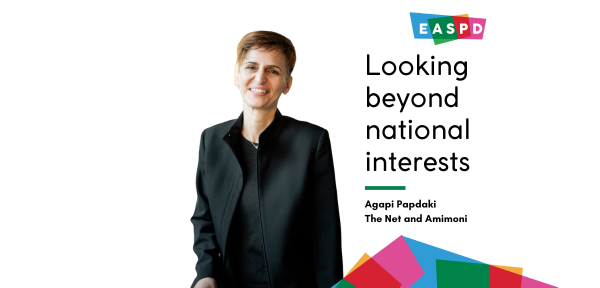Agapi talks about responsibility as an EASPD Board Member

Agapi Papadaki, Early Childhood Intervention expert from Greece, gave us insights on her journey as an EASPD Board Member. She represents not one but two organisations – The Net and Amimoni, at the EASPD Board. The Net is the only Greek Umbrella organisation of service providers for multiply disabled in the country, representing the most important members of the disability ecosystem. Amimoni is a parent’s association for personalised education, care and support multiply disabled and visually impaired (MDVI) people in Greece. Agapi comes equipped with a host of expertise in the disability sector and shares with us the qualities a good EASPD Board Member should have to join the Board!
Why did you join the EASPD Board?
Agapi: I saw potential. When I was asked to join the EASPD Board, I knew the work EASPD was doing and the goals that were being set and achieved. So, it was an easy decision to apply for a Board Member position. For me, representing Amimoni and The Net, for almost 4 years at EASPD was a great opportunity! On one hand we were able to bring visibility of our work at a European level and on the other hand we managed to facilitate the connection of the Greek experiences and priorities into shaping policies at the European level.
This brings me to my next aspiration for cross-regional cooperation. The kind of work we do at EASPD requires different regions to work together and the Board has a healthy representation of various regions of Europe. It really does fulfil its purpose.
What has your experience been as an EASPD Board Member for almost 4 years?
Agapi: EASPD has evolved considerably in the past few years. I will begin with highlighting the increased level of engagement with members. I can see a genuine effort being made to communicate more with members to understand their services and what they expect from EASPD. Secondly, the response to the war in Ukraine. The support provided to families of Ukrainian refugees with disabilities was incredible. EASPD sprung into action and that’s the kind of environment we have at the Board. When needed, we come together and take important decisions quickly. There is no unnecessary waiting around.
Lastly, a significant growth has taken place within the structure of EASPD. Finding the right leadership and making sure the staff in Brussels is well supported led to a change in responsibilities of the Board. Therefore, we focussed on organisational concerns and staff needs considerably in the past few years – we learn to adapt!
According to you, what skill set is needed to be an EASPD Board Member?
Agapi: It is crucial to have a deep understanding and dedication to ensure human rights of persons with disabilities are upheld. This is the starting point for all the decisions we make. Secondly, having a clear vision of what to expect from the EASPD Board Members, in terms of policy, learning and communicating effectively among each other, innovation etc.
A good Board Member should have the ability to look beyond their national interests and keep the bigger picture of a great European organisation in mind, even while taking tough decisions.
What are some lessons you learnt during your tenure as an EASPD Board Member?
Agapi: It is extremely important to be a good listener. This means listening to views of each and every member, without discriminating between them. All voices contribute in their unique way to the discussions that take place during our meetings. Even the less-experienced members need to know that their voice matters.
Secondly, being part of a Board as dynamic as EASPD means encouraging cross-regional cooperation to find solutions and foster innovation.

